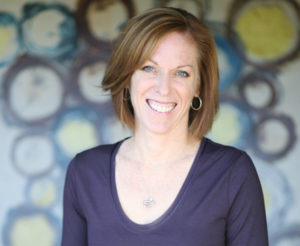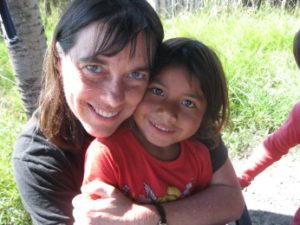Friday, December 22nd 2017
 Excerpt: Liz and Kate chat about pelvic prolapse, and Kate interviews the amazing Julie Wiebe, a pelvic floor therapist who pioneered the “pelvic floor piston” method of breathing.
Excerpt: Liz and Kate chat about pelvic prolapse, and Kate interviews the amazing Julie Wiebe, a pelvic floor therapist who pioneered the “pelvic floor piston” method of breathing.
Summary: Have we got a treat for you! If you’ve had a baby, maybe you’ve experienced some of childbirth’s hidden joys – hemorrhoids, anal fissures, bladder and rectal incontinence, pelvic prolapse, diastasis recti… the list goes on. If you haven’t had a baby and would like to, they may be in your future. It can even happen to folks who don’t have kids, so pelvic floor health is important for women, men, and all sorts of gendered folk.
Never fear, there are things you can do to reduce your risk, or if you have any of these symptoms, you may be able to improve them. Let me introduce you to Julie Wiebe, a physical therapist whose work I’ve been passionate about for the last few years.
Julie Wiebe, PT has over 20 years of experience in both Sports Medicine and Pelvic Health. Her passion is to return women to fitness and sport after injury and pregnancy. She advocates for the awareness of pelvic health issues in fitness and promotes innovative solutions for women through her blog, videos and social media. She shares her evidence-based, integrative approach internationally with both professionals and women through live and online educational programs. You can find out more at www.juliewiebept.com or via social media Twitter/FB/IG @JulieWiebePT. In fact, here is the Instagram post on Crossfit and peeing that we mentioned in the intro:
I think you’re going to love this episode. And if you want more, Julie was kind enough to create a temporary coupon code for Period Podcast listeners! It is Period20 (it is case sensitive), and you get 20% off the pelvic floor piston course. The code expires midnight PST on Jan 5, 2018.

Julie Wiebe, PT, Pelvic Floor Mafia.
Thanks to Ellebox for sponsoring season 2 of PERIOD. Use coupon code “periodpodcast” or this link to get 50% off your order.
Do you want to be a patron, or is there someone on your shopping list who would want to be? Check out my Patreon page for ways to support this podcast. Help me make beautiful things!
Want a better PERIOD?
Subscribe to PERIOD so you don’t miss an episode! Subscribing, especially on iTunes, helps us a ton with promoting the podcast and getting the word out to more people. So does leaving a review, so please do that too!
Call or write me! I am collecting two things right now: your period questions, and first period stories. Leave me a voicemail with either or both at 262-PERIOD-2 (262-737-4632). Don’t forget to tell me how to contact you if you don’t mind my following up.
Other ways to contact me:
I can’t wait to hear what you think! Thanks for listening!
Direct download: here
Permalink: here
RSS: here
Friday, December 15th 2017
 Excerpt: Dr. Claudia Valeggia of Yale University joins me for a wonderful conversation about biological and cultural variation in the experience of the postpartum period.
Excerpt: Dr. Claudia Valeggia of Yale University joins me for a wonderful conversation about biological and cultural variation in the experience of the postpartum period.
Summary: I was so pleased to welcome Dr. Valeggia to PERIOD Podcast! Her research program takes a biocultural approach, that is, the interplay between biological and cultural variables takes a central role in her work to understand how and why women’s bodies vary the way they do. She works with indigenous populations in northern Argentina, her country of origin.
Our conversation ranged from what it’s like to work with the Qom, the indigenous population that is the focus of her work, to her early publications on the concept of “lactational amenorrhea” (which she describes very well in the episode). We also discussed some of the different ways cultures handle the postpartum period. Many non-US cultures recognize the postpartum period as a time of change and healing. Today’s title refers to one practice where men are not supposed to resume sex with their wives until the baby can walk. This is a practice that helps with birth spacing, and also recognizes the work of an early postpartum, breastfeeding mother, not to mention the ways in which her body (and likely mind) need to heal from the experience.

Dr. Valeggia in the field, with Estefania, a Qom girl.
Thanks to Ellebox for sponsoring season 2 of PERIOD. Use coupon code “periodpodcast” or this link to get 50% off your order.
Do you want to be a patron, or is there someone on your shopping list who would want to be? Check out my Patreon page for ways to support this podcast. Help me make beautiful things!
Want a better PERIOD?
Subscribe to PERIOD so you don’t miss an episode! Subscribing, especially on iTunes, helps us a ton with promoting the podcast and getting the word out to more people. So does leaving a review, so please do that too!
Call or write me! I am collecting two things right now: your period questions, and first period stories. Leave me a voicemail with either or both at 262-PERIOD-2 (262-737-4632). Don’t forget to tell me how to contact you if you don’t mind my following up.
Other ways to contact me:
I can’t wait to hear what you think! Thanks for listening!
Direct download: here
Permalink: here
RSS: here
Friday, December 8th 2017
 Excerpt: Join me in a conversation with Maysa Haque, masters student at the University of Regina, as she shares her research into the wide variability of experience Canadian Muslim women have about their periods.
Excerpt: Join me in a conversation with Maysa Haque, masters student at the University of Regina, as she shares her research into the wide variability of experience Canadian Muslim women have about their periods.
Summary: Last week, Dr. Lara Freidenfelds shared her extensive research on modern American experiences of the period. One of the major conclusions of her work was that the American experience of menstruation is strongly shaped by historical context and a move towards scientific explanations of the body. This meant there was, in some ways, a lot less variation than you might expect between women of the same age in terms of their lived experiences.
Interestingly enough, I was recently contacted by Maysa Haque, a Canadian graduate student at the University of Regina’s Department of Religious Studies. She recently completed a Bachelors of Arts & Science at McMaster University, where she studied young Canadian Muslim women’s perceptions and experiences of menstruation. Haque’s dataset was smaller, but also narrower in focus, than Dr. Freidenfelds, and her focus on Muslim women ended up revealing a great deal of variation in their experiences of their periods.
I thought this would be a nice follow up to help us think about variation within and between populations, and the ways in which religion, acculturation, and country of origin might also play a role in how we learn about and live with our periods. Many thanks to Maysa Haque for her engaging interview!

Thanks to Ellebox for sponsoring season 2 of PERIOD. Use coupon code “periodpodcast” or this link to get 50% off your order.
Do you want to be a patron, or is there someone on your shopping list who would want to be? Check out my Patreon page for ways to support this podcast. Help me make beautiful things!
Want a better PERIOD?
Subscribe to PERIOD so you don’t miss an episode! Subscribing, especially on iTunes, helps us a ton with promoting the podcast and getting the word out to more people. So does leaving a review, so please do that too!
Call or write me! I am collecting two things right now: your period questions, and first period stories. Leave me a voicemail with either or both at 262-PERIOD-2 (262-737-4632). Don’t forget to tell me how to contact you if you don’t mind my following up.
Other ways to contact me:
I can’t wait to hear what you think! Thanks for listening!
Direct download: here
Permalink: here
RSS: here
 Excerpt: Liz and Kate chat about pelvic prolapse, and Kate interviews the amazing Julie Wiebe, a pelvic floor therapist who pioneered the “pelvic floor piston” method of breathing.
Excerpt: Liz and Kate chat about pelvic prolapse, and Kate interviews the amazing Julie Wiebe, a pelvic floor therapist who pioneered the “pelvic floor piston” method of breathing.


